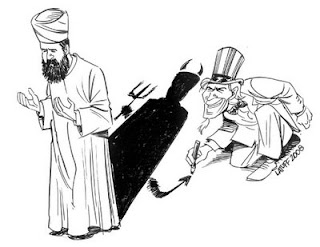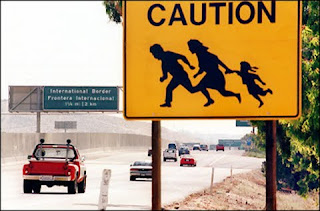
Although the Holy Modal Rounders have seen various sidemen and personnel come and go over the decades, their core and essence is still the original duo, Peter Stampfel (left) and Steve Weber.
When they first appeared in the early '60's their fiddle-and-fingerstyle sound was obviously informed by rural string band music, but their bizarre, surprising, sometimes risqué and frequently psychedelically-derived lyrics delighted unschooled and eclectically-inclined listeners as much as they offended folk and acoustic music purists. Their work was impossible to classify, and one early reviewer, in a brave but unfortunate attempt, called the Rounders "psychedelic folk."
Later in the sixties they hooked up with
the Fugs, essentially the New York vocal-and-songwriting duo of Ed Sanders and Tuli Kupferberg, who played no instruments, making sides like "
Slum Goddess (from the Lower East Side") and "I Couldn't Get High." After that they produced a couple of amphetamine-fueled albums, "Indian War Whoop" and "The Moray Eels Eat the Holy Modal Rounders," then disappeared, only to re-appear in the early '70's with "Good Taste is Timeless," which contained the immortal "Boobs a Lot."
I thought that was their last recorded work together until I was at my daughter's house yesterday and she put on a disc I wasn't familiar with, but recognized immediately as the long-gone Rounders in yet another incarnation. They never did have much polish, and by 1999 when they made "Too Much Fun," whatever refinement they had ever possessed was gone completely, and their voices, especially Weber's, were pretty much shot. But they were still making wonderful songs, such as this one by Stampfel, "
Bad Boy."
Mommy doesn't like him because he's got long hair;
Daddy doesn't like him, he says he heard him swear;
He's a bad boy, but I don't care.
He knows illegal people; he does illegal things,
But he doesn't seem illegal when he plays guitar and sings.
He's a bad boy, but I don't care.
chorusDoesn't it kind of break your heart, doesn't it make you sad,
When the boy you love so dear turns out to be so bad?
He's a bad boy, but I don't care.
Don't ever let a bad boy steal your heart away,
You'll never get it back again until your dying day.
He's a bad boy, but I don't care.
He'll sell your heart on St. Mark's Place in glassine envelopes;
He'll cut it with pig's heart and burn the chumps and dopes.
He's a bad boy, but I don't care.
chorusHe's awfulness incarnate, he's wickedness on wheels;
He'll ruin my reputation -- how wonderful it feels.
He's a bad boy, but I don't care.
He's Sodom and Gomorrah, and Cairo, Illinois
He makes it seem so boring going out with other boys.
He's a bad boy, but I don't care.
chorusMy life is so exciting since I'm going out with him;
Romance is more romantic when you know that it's a sin.
He's a bad boy, but I don't care.
chorusDoing a little research, I discovered that "Too Much Fun" was not the finale; they followed it up a couple years later with "
I Make a Wish for a Potato," which I haven't heard, but the cover art alone makes it a must-have. Will there be more from the Holy Modal Rounders in the New Century? Surely there will be. You can't kill immortality.
 ZOMG Chris Matthews said something I agree with. Something, in fact, that I really agree with real hard.
ZOMG Chris Matthews said something I agree with. Something, in fact, that I really agree with real hard.



































